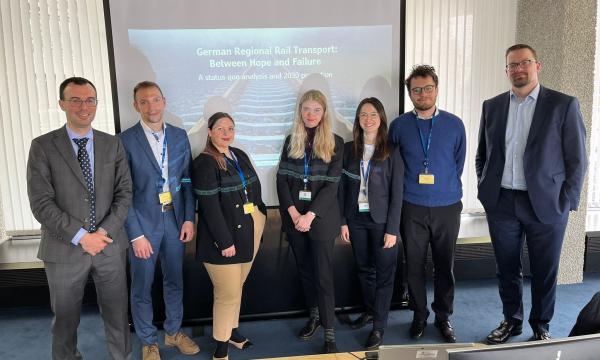
You are here
Chair of Economics, esp. Transport Policy and Spatial Economics
Concluding presentation in Luxembourg: TUD students analyzed regional rail transport in Germany as part of a consulting project with the European Investment Bank.
In March 2023, a team of six TUD students set off for Luxembourg where the culmination of a project awaited: The students had worked on a so-called ‘Capstone
Project’ in cooperation with the European Investment Bank (EIB) during the winter semester 2022/23. In Luxembourg, the team presented the results of their work: concerning “German regional rail transport - between hope and failure.”
Capstone projects: how the EIB endorses dedicated students
What does support for higher education and research look like? The European Investment Bank provides an answer with its Capstone Projects: teams of 4 to 6 Master students are assigned a topic of particular relevance to the EIB. For one semester, the group works on their project with supervision from the EIB. For the final presentation the EIB invites the student to their offices in Luxembourg.
The team of the TU Dresden consisted of students of Economics, Business Administration, International Relations and Transportation Economics.
Regional rail transport in Germany – an analysis
Delayed trains, overcrowded compartments, and defective toilets – criticism of rail transport in Germany is getting louder and louder. What is missing, and how could regional rail transport run better? This is what the TUD team dealt with in their project. In a first step, focusing on regional transport, the students took stock of the situation. The current assessment of the overall condition of German regional rail transport was quite positive – the conditions were rather satisfying. However, regional rail transport faces a number of challenges.
According to the Capstone team, the difficulties include demographic changes, consequences of the COVID pandemic, and infrastructural challenges. In addition, competitive pressure from other modes of transportation is a threat to regional railways. It is not just the overall cost that needs to be convincing in order to get more people deciding against cars and in favor of rail. Other important factors include the duration of the journey, cleanliness, and the occupancy rate of the train. Another challenge in rail transport is finding and recruiting the necessary personnel. Finally, the students emphasized that politics and its agenda play a central role in the development of regional rail transport.
A look into the future
In addition to analyzing the status quo, the students also presented various future scenarios and outlined an expected development of regional rail transport by 2030. Here, the assessment was less positive, because there might be a lack of groundbreaking changes, according to the young team. Some goals in regional rail transport would be missed since the financial hurdles are large and the condition of the infrastructure leaves much to be desired. Working conditions, salaries, and the terms of funding urgently need to be improved so that rail transport can become more competitive and attractive.
The TUD team was very satisfied with their presentation and performance in Luxembourg. For the coming winter semester, another Capstone project is planned with the EIB.

Originalautor
Contact Persons TUD
Prof. Dr. habil. Georg Hirte
Chair of Economics, esp. Transport Policy and Spatial Economics
"Friedrich List" Faculty of Transport and Traffic Sciences, TU Dresden
E-Mail: georg.hirte@tu-dresden.de
Prof. Christian Leßmann
Chair of Economics, esp. International Ecnomics
Faculty of Business and Economics, TU Dresden
E-Mail: Christian.lessmann@tu-dresden.de
Contact Person EIB
Henning Schmidt
Transport economist at the EIB, Mobility Department
